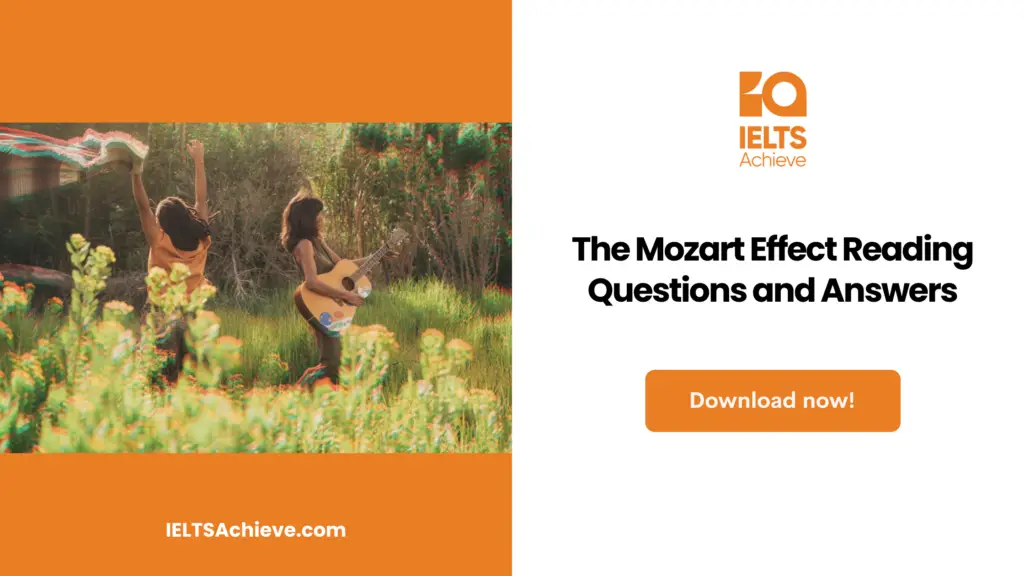The Blog post contains the following IELTS Reading Questions:
- IELTS Reading Locating information
- IELTS Reading summary completion
- IELTS Reading True/False/Not given.
Stay informed and prepared for success – Explore our comprehensive Reading Test Info page to get valuable insights, exam format details, and expert tips for mastering the IELTS Reading section.
IELTS Reading Passage-The Mozart Effect

The Mozart Effect
A. Musicals have often been used to treat the body for generations. Doctors sang to heal the sick, as per the Ebers Papyrus (approximately 1550 BC), another of the oldest health records (Castleman, 1994). Singing has been observed as an element of healing procedures in different civilizations. However, until the invention of the radio, the use of music in healing went into decline in modern medicine. After that, researchers began to realize that playing music had substantial bodily consequences. Music has been shown to relieve stress, and researchers have shown that music might lower blood pressure. Music is often used to relieve nausea during cancer chemotherapy, after surgery to minimize stress on the endocrine system, during pregnancy, and during the rehabilitation process (Castleman, 1994; Westley, 1998). It has been demonstrated to reduce pain while also improving the defense system’s efficiency. In Japan, music collections are used as a kind of therapy. For example, if you have a migraine or headache, Mendelssohn’s “Spring Song,” Dvorak’s “Humoresque,” or a section of George Gershwin’s “An American in Paris” are all recommended albums (Campbell, 1998). In a concept known as the “Magnolia Effect,” music is also employed to aid learning.
B. In a 1993 experiment, Frances H. Rauscher, Ph.D., proved the link between music and learning. His research showed that a 10-minute dosage of Mozart could increase intellectual capacity momentarily. After listening to quiet relaxation tapes or Mozart’s “Sonata for Two Pianos in D Major” for a brief period, groups of students took IQ tests. He discovered that after quiet, the average intelligence level remained at 110, and then after relaxing tapes, the score increased by one point. But, upon playing Mozart’s music, the index rose to 119. (Westley, 1998). Even pupils who disliked the music saw an improvement in their IQ scores. “Listening to complex, non-repetitive music, such as Mozart’s,” Rauscher proposed (Campbell, 1998). Songs can also be used to promote learning in a phenomenon known as The Mozart Effect.
C. Rauscher and Hong Hua Li of Stanford conducted the same study on rodents. Rats also showed an improvement in their intellectual abilities. According to these recent studies, rats exposed to Mozart’s music had “enhanced gene transcription of BDNF (a neuronal transcription factor), CREB (a memory and cognitive molecule), and Synapsin I (a synaptic growth protein)” in the hippocampus in comparison to rodents subjected to white noise (for instance, the whooshing sound of a V radio tuned between stations).
D: The exact mechanisms for the creation of these improved learning pathways are still being investigated by researchers. Regardless of its kind, neuroscientists believe that music can help create and maintain links among neurons in the cerebral cortex. Certain connections, such as those for heartbeat and breathing, have already been created when a newborn is born. New brain connections are generated as new evidence is acquired and mechanical abilities are developed. Neurotransmitters that are not frequently used perish, whereas those that are frequently used create strong connections. Although many of these brain connections require expertise, they must also develop within a specific time window. A youngster born with cataracts, for example, is unable to form connections in the visual brain. The child’s vision develops normally if the cataracts are treated by the operation as soon as possible. Whereas if cataracts are removed just after the age of two, the child will stay blind since those routes can not form themselves.
E. Music appears to work in a similar way. A study by the University of Konstanz in Germany discovered in October 1997 that music truly rewires brain networks (Begley, 1996). While some of these networks are established for the physical abilities required to perform music, simply listening to music develops higher-order cognitive connections. Music might thus be considered “brain training,” as it improves focus and intuition.
F. You’re not alone if you’re skeptical of the allegations made by proponents of The Mozart Effect. Numerous people attribute certain children’s superior learning to other personality attributes like desire and perseverance, which are essential across all kinds of training. There’ve been allegations that this had an impact on the outcomes of other studies. Several people are also suspicious of the media’s role in turning a single survey into a trend among families and teaching staff. After the official disclosure of The Mozart Effect, revenues for Mozart remained at the top of the charts for 3 weeks. In an essay, Michael Linton said that the study that started this phenomenon (research by scientists at the University of California, Irvine) only demonstrated a brief increase in intelligence, which was not large enough to endure the entire experiment. Music was employed to promote intelligence in Confucian civilization, and Plato referred to Pythagorean music in The Republic when describing its ideal condition.
G. Music couldn’t generate any significant changes in either of these cases, and the hypothesis ultimately died out. Linton wonders. If hearing Mozart’s music boosts IQ and promotes divinity, why aren’t the world’s greatest and most religious people Mozart experts? “Why hasn’t there been more recorded proof if The Mozart Effect generates such major effects, as Linton suggests?”
H. Although the “popularity” of the hypothesis has faded, there are many other proponents (and detractors) of the assertions made in 1993. There hasn’t been a flood of evidence to back it up since that initial experiment. Many families, meanwhile, swear by The Mozart Effect after listening to classical music while pregnant or when their infants are infants.According to a student, playing music while reading will aid me in memorizing. If we look at this debate from a scientific viewpoint, while there is some proof that music increases activity in the brain, real benefits in cognitive performance have yet to be proved.
Unlock your full potential in the IELTS Reading section – Visit our IELTS Reading Practice Question Answer page now!
Recommended Questions:
Renewable Energy IELTS Reading Question with Answer
The Mozart Effect IELTS Reading questions
Questions (1-5)
Reading Passage has eight paragraphs A-H. Which paragraph contains the following information? Write the correct letters A-H in boxes 1-5 on your answer sheet.
1. A description of how music affects the brain development of infants
2. Public’s first reaction to the discovery of The Mozart Effect
3. The description of Rauscher’s original experiment
4. The description of using music for healing in other countries
5. Other qualities needed in all learning
Questions (6-8)
Complete the summary below. Choose NO MORE THAN ONE WORD from the passage for each answer. Write your answers in boxes 6-8 on your answer sheet. During the experiment conducted by Frances Rauscher, subjects were exposed to the music for a 6________ period of time before they were tested. And Rauscher believes the enhancement in their performance is related to the 7__________ nature of Mozart’s music. Later, a similar experiment was also repeated on 8_____________
Boost your performance in Summary, Notes, Table, and Flowchart Completion tasks. Click here to explore our detailed guide and learn how to effectively complete summaries, notes, tables, and flowcharts in the IELTS Reading section.
Questions (9-13)
Do the following statements agree with the information given in the Reading Passage? In boxes 9-13 on your answer sheet, write
- TRUE if the statement agrees with the information
- FALSE if the statement contradicts the information
- NOT GIVEN if there is no information on this
9. All kinds of music can enhance one’s brain performance to somewhat extent.
10. There is no neural connection made when a baby is born.
11. There are very few who question The Mozart Effect.
12. Michael Linton conducted extensive research on Mozart’s life.
13. There is not enough evidence in support of The Mozart Effect today.
Want to excel in identifying the writer’s views and claims? Click here to explore our in-depth guide on how to accurately determine Yes, No, or Not Given in the IELTS Reading section.
Unlock your full potential in the IELTS Reading section – Visit our IELTS Reading Practice Question Answer page now!
Recommended Questions:
Renewable Energy IELTS Reading Question with Answer
The Mozart Effect IELTS Reading Answers
1. Answer: D
2. Answer: G
3. Answer: B
4. Answer: A
5. Answer: F
6. Answer: brief
7. Answer: complex
8. Answer: Rats
9. Answer: True
10. Answer: False
11. Answer: False
12. Answer: Not Given
13. Answer: True

We hope you found this post useful in helping you to study for the IELTS Test. If you have any questions please let us know in the comments below or on the Facebook page.
The best way to keep up to date with posts like this is to like us on Facebook, then follow us on Instagram and Pinterest. If you need help preparing for the IELTS Test, join the IELTS Achieve Academy and see how we can assist you to achieve your desired band score. We offer an essay correction service, mock exams and online courses.
